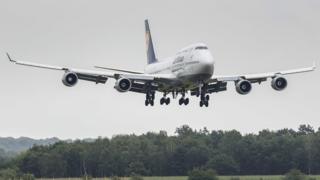 Image copyright
Image copyright
EPA
Boeing has said it will stop making its classic 747 plane as one of a series of changes it has announced in the face of massive losses.
The company said production of some other planes, including the troubled 737 Max, will be slower than expected.
Boss Dave Calhoun said the firm is also looking at job cuts on top of the 10% reduction in staff already announced.
“The reality is the pandemic’s impact on the aviation sector continues to be severe,” he said.
As the coronavirus has devastated air travel, airlines around the world have responded by reducing their fleets and delaying or cancelling aircraft orders.
This month British Airways became the latest to say it was retiring all of its 747 jets – about 10% of its fleet – citing the fall in passenger demand. Australian airline Qantas is among the other firms retiring the jet, which marked its 50th anniversary last year.
- BA retires entire 747 fleet after travel downturn
- Boeing job cuts start to hit nearly 13,000 workers
The pandemic has exacerbated the crisis facing Boeing, which was already in trouble following two fatal crashes of its 737 Max plane.
The jet has been grounded since last March, costing the company some $20bn. The scandal led to the ouster of top executives and a string of ongoing investigations.
Boeing said it has re-started production of the 737, but it expects the rate of manufacturing to remain low for the foreseeable future as the virus weighs on the industry.
It said it hoped to be making 31 per month by the beginning of 2022 – instead of during 2021 as planned. That would be roughly half the rate of the firm’s production before the grounding.
“While there have been some encouraging signs, we estimate it will take around three years to return to 2019 passenger levels,” Boeing said.
Boeing’s $2.4bn loss
Boeing said it lost $2.4bn in the three months ending 30 June, as sales fell 25% to $11.8bn.
The sales decline was driven by its commercial unit, which serves passenger airlines. Revenue in that division dropped 65%, as the firm delivered just 20 planes in the quarter, compared to 90 a year ago.
Revenues in the firm’s defence, space and security unit were essentially flat at $6.5bn.
Boeing said the slowdown may mean deeper job cuts on top of the roughly 16,000 layoffs already planned.
“Our government services, defence and space programs provide some critical stability for us in the near-term as we take tough but necessary steps to adapt for new market realities,” Mr Calhoun said.
“We are taking the right action to ensure we’re well positioned for the future.”